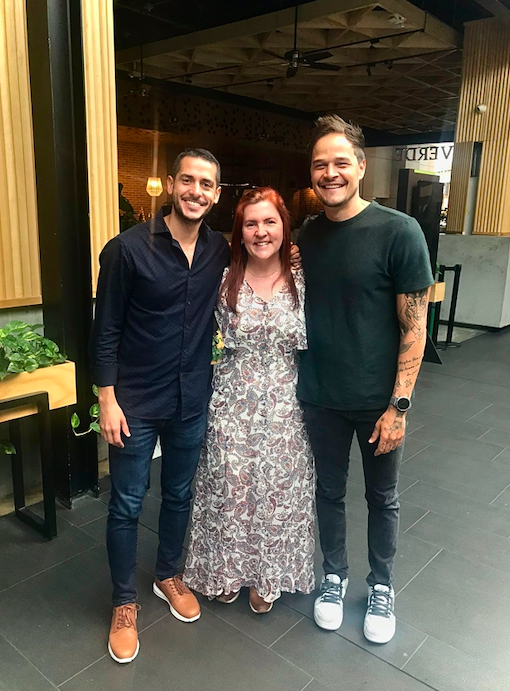Sebastián Osío, one of Mundo Verde’s four owners, transformed a small brand into a recognized restaurant known for its healthy and balanced dishes.
Since the beginning of the ‘Mundo Verde’ brand, Osío and his three partners have faced a multitude of challenges, including economic factors, personnel issues, the pandemic, and competition from other establishments. Rather than being stuck in these obstacles, they chose to tackle them by using the brand essence and resourcefulness to transform Mundo Verde into the successful establishment it is today.
“We are four partners. We have been fortunate enough to finance ourselves partly with banks and partly with families. It has been a very difficult process,” Osío said.
After realizing his lack of passion for studying international relations, Osío left EAFIT and pursued his entrepreneurial calling. Thirteen years ago, while Osío and his brother were searching for a location to establish a wine and tapas bar, they previously had, they stumbled upon the “Mundo Verde” brand. At that time, it was a small family restaurant and vegetable producer on the verge of closure, intending to liquidate all assets. Recognizing an opportunity, the brothers decided to buy the brand.
“Since we entered, we felt that the business had an interesting vibe. We have always liked, my brother and I, the world of healthiness, food, care, and sports. So it was like a click that we immediately felt, and we thought, why don’t we offer something to this family and keep the brand? And indeed, that’s how it was,” Osío said.
Owning a restaurant is not an easy task. Besides the significant upfront costs and staffing needs, inflation poses a major challenge. The rising product costs, force restaurants to increase menu prices, sometimes customers don’t understand this. As a result, Mundo Verde’s customer volume has decreased.
“Unfortunately, everything that has become more expensive, one has to pass that on to the price of the product, so leases become more expensive for us, inputs become more expensive, and we have to increase prices. Perhaps people don’t understand that very well. They think the restaurant is raising prices to make the owners rich when it’s not like that,” Osío said.
Furthermore, another significant challenge was the impact of the pandemic. Osío describes how the restaurant was affected, highlighting its broader implications not only for their establishment but also for all restaurants within the community.
“I believe the pandemic hit us very hard. I think all restaurants, obviously, after the pandemic, it was difficult for us to stabilize again because the company incurred significant losses for a long time, which made the relaunch very, very slow when we were no longer in a pandemic. Nearly two years went by where we were very inactive,” Osío said.
A critical aspect of owning a restaurant is its branding and how customers perceive the business. Osío and his partners have carefully considered this, refining their brand through multiple names and slogans until they found one that identified them strongly. Their goal was to move beyond the perception of being solely a salad-focused, health-driven establishment and transform it into a restaurant of balanced, enjoyable dishes.
“Right now, we are undergoing a reform called ‘Mundo Verde, la abundancia de lo bueno,’ which aims to embrace abundance in life, whether it’s about healthy eating or being able to attend a party with friends. There’s nothing wrong with that. Enjoying a dessert, cherishing family and friends—everything is about the abundance of goodness, which is what we want to promote,” Osío said.
The brand holds significant potential for growth and expansion. Osío envisions opening additional locations not only in Medellin but also in Bogota and other major cities. However, achieving this goal demands both effort and patience, as the aim is to expand while maintaining the quality and essence that defines the brand.
We really want to expand the brand everywhere, but without growing wildly, because that’s where one loses control and essence. So the idea is to find a balance of being able to continue opening locations, but without losing the essence and remaining very focused on service,” Osío said.



